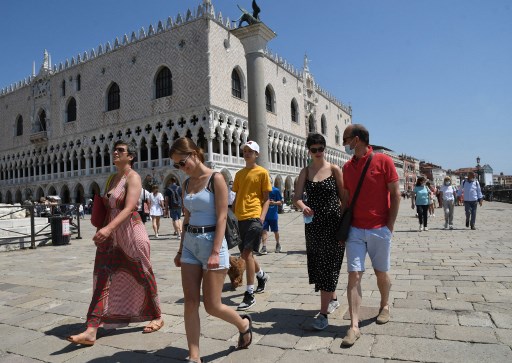**UPDATE: Italy on Friday June 18th announced new quarantine rules for UK arrivals. See the latest news here.**
“We test those who enter Italy. If infections start to rise again, [Italy] too should reinstate the quarantine for those arriving from England. But we’re not there yet,” Prime Minister Mario Draghi said following a press conference at the end of the G7 meeting in the UK, Rai reports.
The British government is set to announce on Monday that a planned easing of lockdown restrictions will be pushed back by four weeks, according to the BBC, amid a rapid rise in cases of the Delta variant first detected in India.
Asked if Italy was also looking at changing its reopening plan this summer, Draghi said: “For now, there’s no reason to think that this will happen.”
READ ALSO: What you need to know if you’re travelling to Italy in summer 2021
“It depends a lot on the contagion rate, if infections should shoot up … but this is not what we’re seeing in other European countries,” he added, pointing out that “Spain and Greece do not require quarantine from England.”
France, Germany, Switzerland and Austria however last month put quarantine rules and other tough travel restrictions back in place for travellers from the UK amid concerns about Delta
Spain on the other hand removed all restrictions for British tourists. From May 24th, UK holidaymakers can visit Spain without the need for any testing or quarantine.
Italy has banned travel from India, Bangladesh and Sri Lanka amid concern over the spread of the Delta variant in those countries.
But, while Italy has not completely dropped rules on UK travel (a negative PCR or antigen test result is still required), the government appears reluctant to put further restrictions in place at the start of the lucrative tourist season.
Travel to Italy from the UK is far from straightforward already, as British ‘amber list’ rules require a ten-day quarantine on arrival from Italy and the purchase of travel-testing kits which cost around £200 per person. There are also fewer flights operating than expected.
Stopping tourism from the UK altogether this summer would cost Italy 1.5 billion euros in lost revenue, according to analysis by Coldiretti, the industry group representing Italian agriculture.
READ ALSO: What Covid-19 tests do I need for travel between Italy and the UK?

Italian health officials had previously said they believed vaccines may be able to mitigate the impact of Delta and any other new strains of coronavirus.
Italian deputy health minister Pierpaolo Sileri told Radio 24 in late May that he was not worried about the Indian variant for two reasons: “The first is that there is no evidence that it is resistant to vaccines, and the second, more general, is that research has made great strides in creating safe and effective vaccines.”
“Even if a variant emerged that could partially resist them, we would be able to respond,” he said.
However, in the UK, public health officials are now concerned about the Delta variant because it “partially evades vaccines, is at least 40% more transmissible than the Alpha variant, and appears to double the risk of hospitalisation”, the BBC reports.
READ ALSO: Europe remains at risk of autumn Covid resurgence, WHO warns
Though Italy’s vaccination campaign has accelerated and improved in recent months, only around one quarter of the population is fully immunised at the moment, the latest government data shows.
In Italy, 172 cases are known to have been caused by the Delta variant so far according to the Gisaid database. Alpha (or B.1.1.7) is still the dominant variant, accounting for some 93 percent of cases in the country according to the latest Italian government data.
However, Italy collects and analyses far less data on new virus strains than the UK does, meaning that the picture in Italy is incomplete and it’s hard to compare information from the two countries.
So far in Italy only 1.11% of all positive swab tests have been sequenced to identify the strain.
For more information on international travel to and from Italy, see the Foreign Ministry’s website.
Please note The Local is not able to give advice on individual cases.



 Please whitelist us to continue reading.
Please whitelist us to continue reading.
Member comments